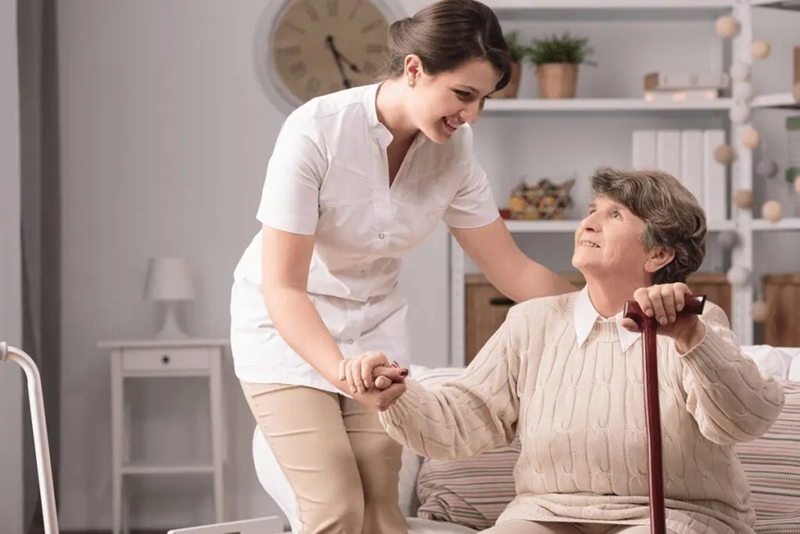Your parents are adamant that they continue to live in their home, and you agree. However, the last few times you visited, you felt that they weren’t taking care of themselves as well as they used to. Most elderly Americans live in a private home – and that’s the way they like it. Only about 10% of elderly Americans live in residential facilities such as nursing homes or skilled care.
A 2018 AARP survey found that 76% of Americans age 50 or older want to live in their current residence, and 77% would like to stay in their current community as long as possible.
It’s the “as long as possible” that can be tricky for them – and you – to gauge. Your elderly parent or relative may not be the best judge of their ability to take care of themselves or their home. Whether you visit often or only for major holidays, you may not be sure that the changes in their behavior are cause for concern.
Although there is no test to take that can definitively determine whether your senior needs assistance, there are signs that can alert you. In this post, you’ll learn 21 changes to watch for regarding residence, physical health, and mental health signs in the home that may indicate an aging adult needs home care assistance.
7 Residence Signs That Home Care is Needed
- Spoiled food in the refrigerator or cupboards
- Dead houseplants
- Piles of unopened mail
- Broken items remain unrepaired
- Excessive clutter or piles and bags of items
- Pet messes indoors
- Possessions stored in odd places
- Milk in the cupboard
- Dirty clothes in the dishwasher
- Cookbooks in the oven
It’s easier to notice a need when a formerly tidy homemaker’s house becomes messy and dirty. If your grandmother had always taken care of her houseplants, some of them decades old, but now forgets to water for weeks on end, you know she may need your help.
With the less-than-tidy, watch for unusual changes, particularly if your loved one doesn’t seem to notice anything is different. Investigating strong odors, you may find rotting food, soiled clothing, rodent droppings, or pet messes. Spoiled food can indicate your elder is overwhelmed by grocery shopping or meal prep, or they may not be able to see or smell that there’s something off.
7 Physical Health Signs That Home Care is Needed
- Bathroom accidents or soiled underpants
- Difficulty walking, standing for a while, or going from sitting to standing
- Unexplained bruises and wounds
- Sudden weight loss
- Sudden weight gain
- Eating mostly sweets and snacks
- Poor personal hygiene
- Sour body odor, even though your senior claims they just took a shower
- Wrinkled and stained clothing
- The washing machine looks unused
Unexplained bruising or wounds can indicate your elder has fallen. Our balance changes as we age. Falls are the number one cause of fatal and non-fatal injuries in seniors. Falls are a serious concern. According the CDC, one out of five falls, may cause serious injury. Loss of balance can also cause less serious issues. If your senior is having balance issues, they may not be able to get to the bathroom in time. They may stop eating healthy foods because they can’t safely stand long enough to prepare meals.
Strong body odor and other signs of poor personal hygiene can be the result of everything from fear of falling in the shower to lack of manual dexterity to get dressed or forgetting when they last bathed or how to do laundry. There’s a big difference between no longer being a fashionista versus wearing dirty, stained clothing with holes or missing buttons.
Changes in weight may indicate an illness; check-in with your loved one’s health care provider to learn if an exam or testing is needed. Disinterest in eating healthy foods can be the result of dental care issues or loss of ability to prepare foods. Dehydration may result if they are afraid that consuming beverages will lead to bathroom accidents.
7 Mental Health Signs That Home Care is Needed
- Sudden changes in temper or mood
- Forgetting appointments and regular outings
- No interest in long-time hobbies
- Wearing clothes not appropriate for the occasion or weather
- Repeating the same stories over and over
- Wandering or getting lost in familiar places
- Not remembering words or names of friends and family
Your dad always got along with everyone, but lately, he’s been yelling at strangers – and you – for no reason. The avid woodworker and crossword puzzle champ now spends most of his waking hours mesmerized by so-called reality TV programs. Last week, a neighbor told you that she found your dad walking without shoes when she got home from her second-shift nursing job.
We all may experience moments when we can’t recall someone’s name or misplace our house keys. Changes in cognitive behavior can happen so gradually that it takes you a while to realize that your loved one is experiencing more than common age-related lapses. If they are unable to make the right decisions, their safety can be in jeopardy.
Getting Help for Your Elderly Loved One
Even when you and your family live nearby, you may not be able to provide the level of care your loved one needs to remain in their home. Reassure them that your goal is the same as theirs – to help them maintain their independence. To continue to live on their own, they just need a little help from someone trained to assist.
SmithLife Homecare can assist with everything from food shopping and meal prep to housekeeping or bathing and dressing. They can remind your loved one to take medications on schedule and to eat healthy foods and drink enough fluids. Or perhaps your loved one may simply need someone to drive them to appointments and to provide companionship.
Whether you need assistance for a loved one, neighbor or friend, daily, part-time, or for a week while you are on vacation, we can help. Contact us today.


